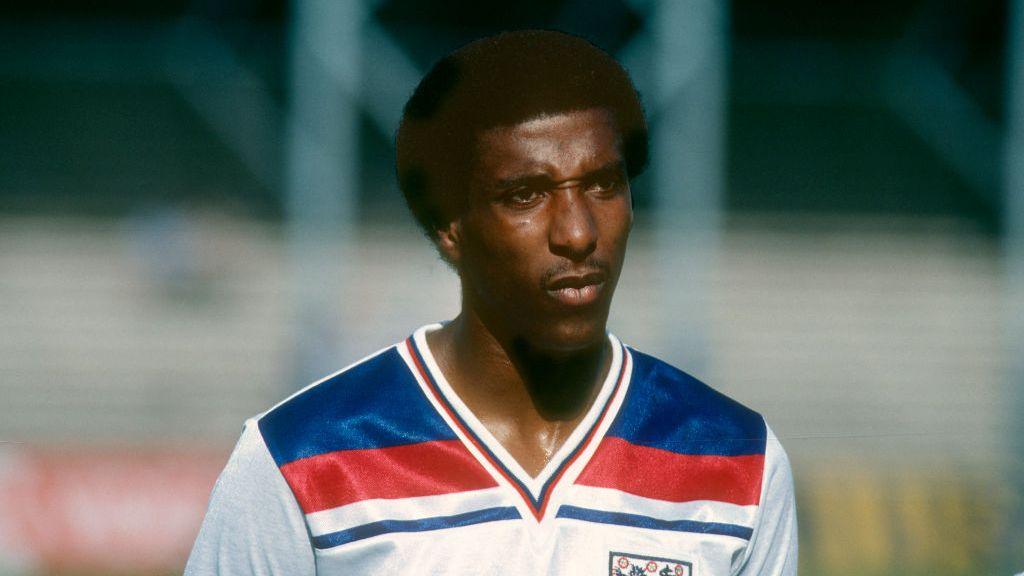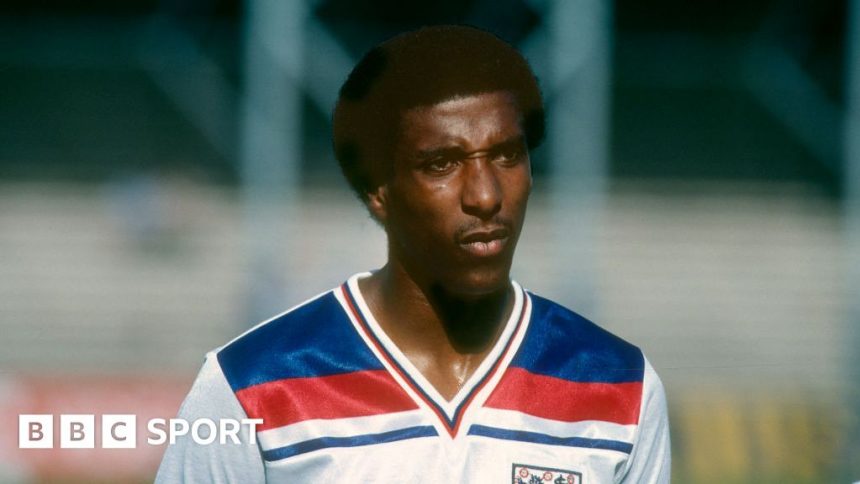To be the first at anything is an unbelievable honour – Anderson

Viv Anderson played for England 30 times between 1978 and 1988
-
Published
“In the 1970s it was what you had to go through to survive – I just desperately wanted to be a professional footballer.”
The words of the first black man to play for the senior England team – Viv Anderson – have a steely, serious and thought-provoking undertone.
Meeting and interviewing him was a cathartic experience for me – he was a black footballing trailblazer that every Caribbean household cherished.
It was the year of my birth, 1978, when Anderson walked out for England against Czechoslovakia at Wembley, taking his place in history.
“To be the first at anything is an unbelievable honour – to be honest I don’t know where it comes from because my dad was always into cricket – I broke the mould there,” Anderson recalled.
“The Queen and Elton John sent me a telegram of congratulations – my mum and dad were interviewed all week – it was a big thing.”
‘An unbelievable honour’ – Viv Anderson on being England men’s first black footballer
For Anderson, it was all about the football. But almost unbeknown to him, his inclusion within the England team had ramifications that travelled far beyond the pitch.
Not only did he help open the door for other talented black players to be considered for England, but for myself and many other families of British-Caribbean descent, he helped legitimise our place within wider society.
The former Nottingham Forest, Arsenal and Manchester United full-back was one of the first that we saw simultaneously represent England and ‘us’ on the field of play. It was an empowering moment of validation – a moment of feeling truly accepted.
“I didn’t feel pressure, I just wanted to play football,” Anderson, who went on to win 30 England caps, said.
He describes the moment he walked out on to the pitch.
“It was a really unique experience, it was 100,000 [fans] – I could hear the crescendo getting louder and louder as I walked out, it was just an unbelievable experience not just for being black, but for playing for my country.”
Anderson made 120 appearances for Arsenal between 1984 and 1987
The abhorrent racial abuse that Anderson faced from the terraces in the 1970s is very well documented.
The defender, who won the First Division with Forest in 1978, and the European Cup in 1979 and 1980, credits his parents and strong Jamaican upbringing for giving him the dignity and strength to overcome the hate.
“My parents were part of the Windrush generation – it took my mother three weeks to come from the Caribbean on a boat,” he said.
“They didn’t have luxury cabins or any stuff like that, so what they went through is absolutely paramount to the way I was brought up and the way I conduct myself – it was always down to my parents.”
Anderson’s respect and gratitude for his parents and their guidance was clear for me to see. But despite deep-rooted challenges with racism, the game itself also played its part.
Anderson played for Nottingham Forest, Arsenal and Manchester United in a 20-year football career
Growing up in Nottingham, Anderson signed for Forest in 1974 and it was his experience under legendary manager Brian Clough that he reveres as a turning point in his career, and importantly, his attitude towards the hostility.
“He helped me in those times when things were hard,” Anderson said.
He recalled a Newcastle match where he was booed loudly when he went to warm-up pre-match.
He went back into the dressing room and told Clough he did not think he could play.
“He looked me in the face and he said, ‘you’re playing’,” Anderson said.
Clough then added: “You wouldn’t be here if you wasn’t good enough, you have the ability to play in this team and just go and show people what you can do.”
Anderson, now 68, retired in the mid 1990s after an illustrious career, which also included playing for Arsenal, Sheffield Wednesday, Barnsley and Manchester United – where he was Sir Alex Ferguson’s first signing.
He said the only black person he had seen on television playing football when he was growing up was Clyde Best, who played for West Ham.
As he and I spoke, my childhood memories of the pictures I sketched of Anderson playing came flooding back. I remember proudly sticking those drawings to my bedroom wall. My own grandparents were of the Windrush generation too.
To feel that personal connection with a black British sporting icon further confirmed to me that there truly was a unique essence within the Windrush generation, that resonated so deeply in their children.
As a child, drawing pictures of Anderson wasn’t a case of me wanting to be a footballer like him – it was quite simply that he looked like me.
And that, in its most simplest form, is the great power of representative inclusion and why football can be a true platform for wider positive and societal change.
Related topics
-
-
Published1 October
-
-
-
Published6 June
-







